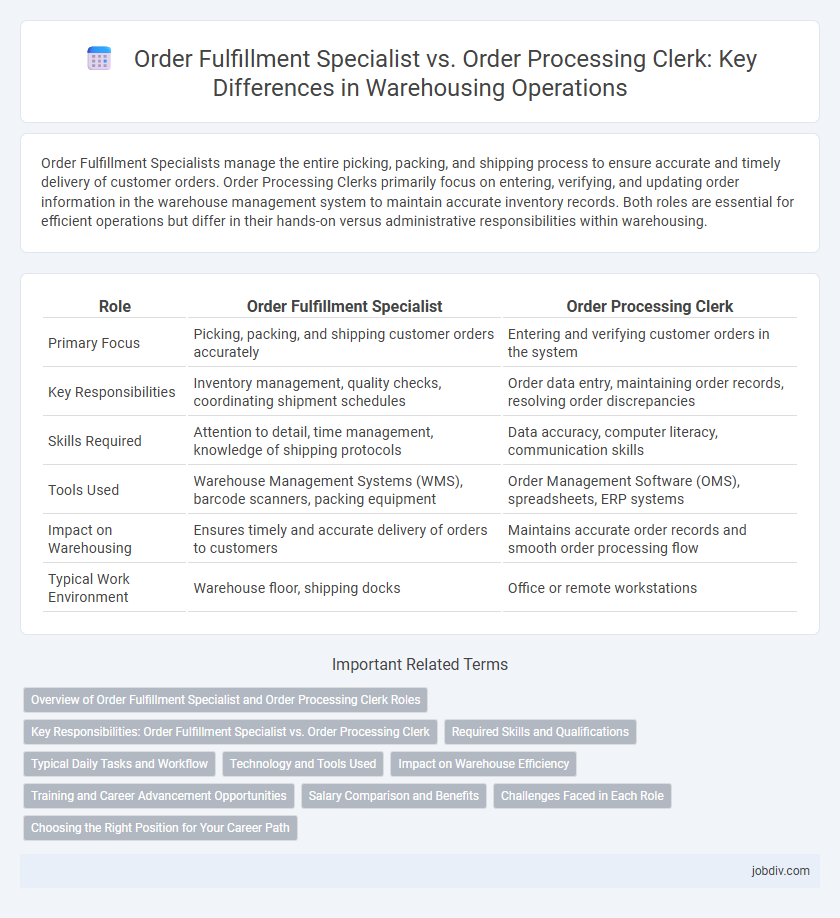Order Fulfillment Specialists manage the entire picking, packing, and shipping process to ensure accurate and timely delivery of customer orders. Order Processing Clerks primarily focus on entering, verifying, and updating order information in the warehouse management system to maintain accurate inventory records. Both roles are essential for efficient operations but differ in their hands-on versus administrative responsibilities within warehousing.
Table of Comparison
| Role | Order Fulfillment Specialist | Order Processing Clerk |
|---|---|---|
| Primary Focus | Picking, packing, and shipping customer orders accurately | Entering and verifying customer orders in the system |
| Key Responsibilities | Inventory management, quality checks, coordinating shipment schedules | Order data entry, maintaining order records, resolving order discrepancies |
| Skills Required | Attention to detail, time management, knowledge of shipping protocols | Data accuracy, computer literacy, communication skills |
| Tools Used | Warehouse Management Systems (WMS), barcode scanners, packing equipment | Order Management Software (OMS), spreadsheets, ERP systems |
| Impact on Warehousing | Ensures timely and accurate delivery of orders to customers | Maintains accurate order records and smooth order processing flow |
| Typical Work Environment | Warehouse floor, shipping docks | Office or remote workstations |
Overview of Order Fulfillment Specialist and Order Processing Clerk Roles
Order Fulfillment Specialists manage the entire order lifecycle by coordinating inventory, packaging, and shipping to ensure timely delivery and customer satisfaction. Order Processing Clerks focus on entering, verifying, and updating order information in warehouse management systems, ensuring accuracy and smooth workflow. Both roles are critical for efficient warehouse operations but differ in scope, with specialists overseeing fulfillment and clerks handling administrative order details.
Key Responsibilities: Order Fulfillment Specialist vs. Order Processing Clerk
Order Fulfillment Specialists manage the entire order lifecycle, from picking and packing to shipping and ensuring timely delivery, while also coordinating with inventory control and logistics teams. Order Processing Clerks primarily handle order entry, data verification, and maintaining accurate records in inventory management systems to support seamless transaction flow. Both roles are critical in warehouse operations, with the Specialist focusing on physical order execution and the Clerk emphasizing administrative accuracy and data integrity.
Required Skills and Qualifications
Order Fulfillment Specialists require strong inventory management capabilities, proficiency in warehouse management systems (WMS), and excellent organizational skills to ensure accurate picking, packing, and shipment of orders. Order Processing Clerks must possess data entry accuracy, familiarity with order management software, and basic customer service skills to handle order verification and documentation efficiently. Both roles demand attention to detail and the ability to work under time-sensitive conditions, but specialists typically need more technical knowledge related to logistics and supply chain coordination.
Typical Daily Tasks and Workflow
Order Fulfillment Specialists manage the complete cycle of picking, packing, and shipping customer orders, ensuring accuracy and timely delivery while coordinating with inventory and logistics teams. Order Processing Clerks focus primarily on entering and verifying sales orders, updating order statuses, and maintaining database accuracy to support seamless transaction flow. Both roles require attention to detail and communication with warehouse staff to optimize operational efficiency.
Technology and Tools Used
Order Fulfillment Specialists leverage advanced warehouse management systems (WMS) and automated picking technologies to optimize inventory accuracy and expedite shipment processing. Order Processing Clerks typically utilize enterprise resource planning (ERP) software and barcode scanning tools to handle data entry and order verification efficiently. Both roles rely on integrated digital platforms but differ in the complexity of technology applications, with specialists focusing on end-to-end fulfillment automation and clerks emphasizing accurate order documentation.
Impact on Warehouse Efficiency
Order Fulfillment Specialists streamline warehouse operations by accurately picking, packing, and shipping orders, reducing errors and enhancing delivery speed. Order Processing Clerks focus on entering and managing order information, ensuring data accuracy and timely processing, which supports inventory management and workflow coordination. Both roles significantly impact warehouse efficiency by minimizing delays, improving order accuracy, and maintaining smooth operational flow.
Training and Career Advancement Opportunities
Order Fulfillment Specialists receive comprehensive training in inventory management, shipping logistics, and customer service, positioning them for career growth into supervisory or logistics roles. Order Processing Clerks typically undergo focused training on data entry and documentation accuracy, with advancement opportunities primarily in administrative or clerical positions within warehousing operations. Specialized certifications and cross-training in supply chain technologies significantly enhance career advancement potential for both roles.
Salary Comparison and Benefits
Order Fulfillment Specialists typically earn a median salary ranging from $35,000 to $45,000 annually, reflecting their role in managing inventory accuracy and coordinating shipments, while Order Processing Clerks have an average salary of $28,000 to $38,000, primarily handling data entry and order tracking. Benefits for Order Fulfillment Specialists often include performance bonuses and healthcare coverage due to their critical role in supply chain operations, whereas Order Processing Clerks may receive standard benefits such as paid leave and retirement plans. The wage differential underscores the higher responsibility and skill level required for order fulfillment roles, influencing both salary and comprehensive employee benefits.
Challenges Faced in Each Role
Order Fulfillment Specialists face challenges such as managing inventory accuracy, coordinating timely shipments, and handling complex customer requirements to ensure on-time delivery. Order Processing Clerks often struggle with data entry errors, maintaining updated order information, and efficiently processing high volumes of orders under tight deadlines. Both roles require strong attention to detail and adaptability to fluctuating demand and logistical disruptions in warehouse operations.
Choosing the Right Position for Your Career Path
Order Fulfillment Specialists manage the entire lifecycle of customer orders, ensuring accurate picking, packing, and timely shipment, which demands strong organizational skills and attention to detail. Order Processing Clerks primarily focus on data entry and order verification, playing a critical support role in maintaining accurate inventory records and order tracking. Selecting the right position depends on whether you prefer hands-on logistical coordination with operational responsibilities or administrative tasks centered on data accuracy and order management.
Order Fulfillment Specialist vs Order Processing Clerk Infographic

 jobdiv.com
jobdiv.com